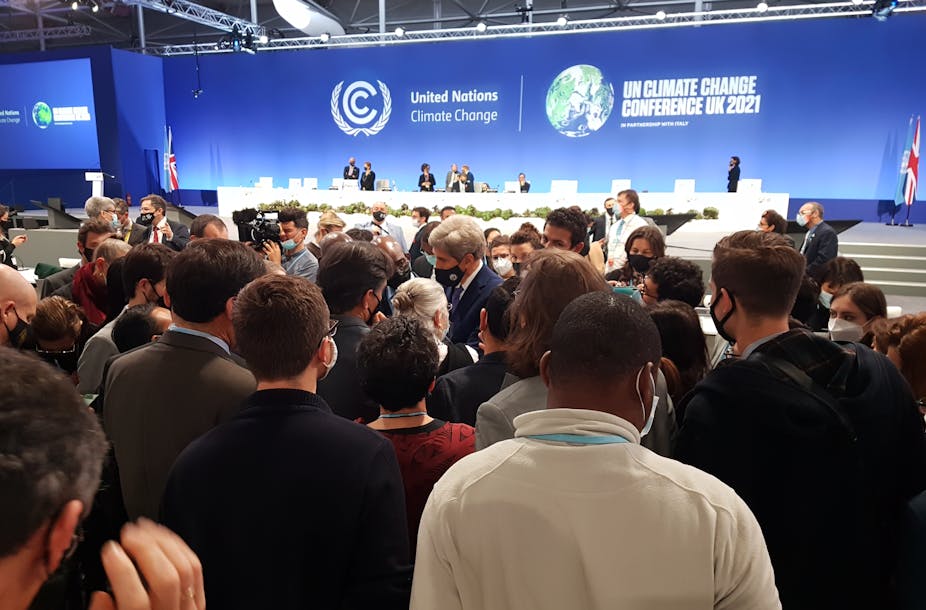A good negotiation is supposed to leave everyone feeling a little unsatisfied. The US presidential envoy on climate, John Kerry, said as much when the latest UN climate change conference – COP26 in Glasgow – drew to a close. The Glasgow Climate Pact it produced will have disappointed most countries for one reason or another. But the delegates who arrived in Glasgow hoping for a new financial settlement between rich and poor countries, to help the latter weather the climate crisis, will feel most let down of all.
This is part five and the final episode of Climate fight: the world’s biggest negotiations, a series on COP26 from The Anthill podcast. In this episode we reported from Glasgow where we spoke with academics who have been researching the UN climate negotiations for decades, and some of the people representing their countries in the talks.
As we heard in the first episode, developed countries promised to pay the developing world US$100 billion (£75 billion) a year by 2020, but fell short by about US$20 billion. Climate finance is supposed to help some of the world’s poorest people survive a crisis they didn’t create and develop economies which are green and resilient.
But there’s something else developing countries argue affluent countries owe them for: loss and damage. Lisa Vanhala, professor of political science at UCL, explains that this refers to the irreversible impacts of climate change which countries cannot adapt to, like sea level rise. Compensation for loss and damage was “really the big thing that developing countries came into [COP26] united in asking for,” Vanhala says. But the result was “no cash on the table”, as the EU and US blocked the creation of a facility for delivering loss and damage finance.
The fortnight in Glasgow passed with a flurry of pre-arranged deals and speeches by world leaders. In the negotiating rooms, delegates from 197 countries gathered to grind out an agreement, often haggling over lines in the draft text long into the night. COP26 was labelled the least accessible UN climate change summit yet, as COVID-19 vaccine hoarding and price gouging for accommodation in Glasgow limited attendance by poorer nations, and rules set by the UK presidency kept civil society groups at bay.
In the first days of the summit, long lines kept delegates and observers waiting outside in the rain for hours. So how did all of this affect the eventual agreement?
“I think a mistake that is commonly made is to assume that all these negotiation outcomes are rational,” says François Gemenne, director of the Hugo Observatory at the University of Liège in Belgium. Gemenne has studied the UN climate negotiation process for a long time, and saw how administrative blunders helped derail an agreement at COP15 in Copenhagen in 2009.
While he says the UK’s handling of the talks and the position of other rich countries on loss and damage will have sowed resentment among developing nations which came to hammer out a deal, “COP is not a one-shot event. It’s a continuous process … and it’s important for countries of the global outh [especially] to keep the process rolling.”
Abhinay Muthoo, a professor of economics and expert in negotiating at the University of Warwick, says “trust is very important… in enriching deals.” The Glasgow Climate Pact reaffirmed the desire of all countries to limit global warming to 1.5°C. But the discord of COP26, which included a last-minute intervention by India and China to water down a resolution on coal power, showed how much work is still needed to bridge the divide between developed and developing countries.
In this episode, we also speak to Hadeel Hisham Ikhmais, a climate negotiator from Palestine, who explains what it’s like to be a negotiator behind closed doors at COP26.
The Climate Fight podcast series is produced by Tiffany Cassidy. Sound design by Eloise Stevens and the theme tune is by Neeta Sarl. The series editor is Gemma Ware.
A transcript of this episode will be available soon.
You can find us on Twitter @TC_Audio, on Instagram at theconversationdotcom or via email. You can also sign up to The Conversation’s free daily email here. You can listen to The Anthill podcast via any of the apps listed above, download it directly via our RSS feed, or find out how else to listen here.

Climate Fight: the world’s biggest negotiation is a podcast series supported by UK Research and Innovation, the UK’s largest public funder of research and innovation.

